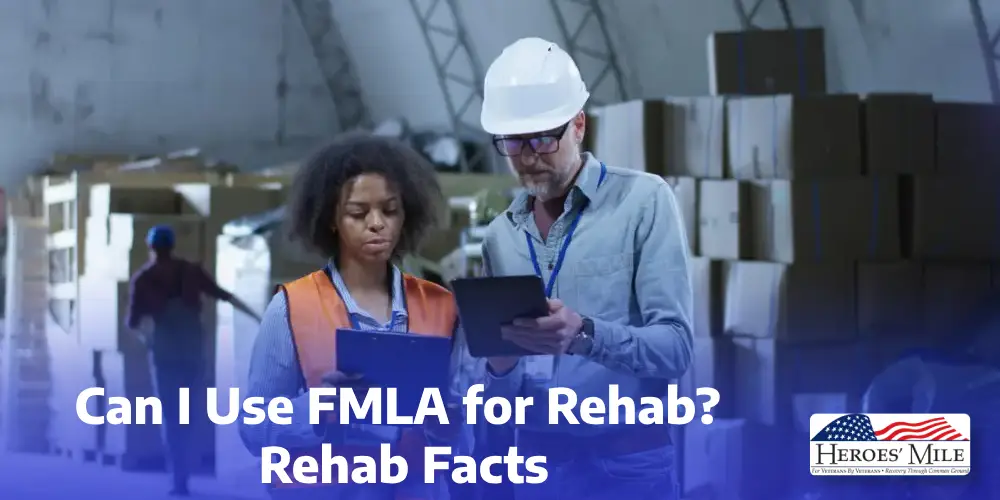After returning from military life, transitioning to civilian living can be hard. And it can be especially hard when you find yourself in a good job, but addiction threatens to ruin it. Left untreated, substance use disorders often lead to problems at work, such as trouble completing assignments and difficulty showing up on time. For individuals who have already had to struggle to find employment, this often leads to asking: Can I use the FMLA for rehab?
Today, we’re breaking down everything about the Family and Medical Leave Act (FMLA) and how individuals can use it to protect their jobs while receiving addiction and mental health support.

Can I Use FMLA for Rehab? Rehab Facts
What Is the FMLA?
The Family and Medical Leave Act was signed into law by President Clinton in 1993. At the time, it was hailed as a protection for working-class families so that they could take time to deal with personal issues without risking their unemployment. Under the FMLA, employees are entitled to 12 weeks of job-protected, unpaid leave in the following situations:
- Birth or adoption of a child
- Care of a new child within the first year of that child’s life
- Care of a spouse, child, or parent who has a serious health condition
- A serious health issue that prevents an employee from performing functions of the job
This is not an exhaustive list of situations where an individual can receive 12 weeks of unpaid time off, but it shows the nature of the situations that the FMLA will cover. But since addiction treatment services are not specifically on this list, it may feel unclear whether you can use the FMLA for rehab.
The good news is that covered employees can absolutely use the FMLA for rehab. And during this period of leave, your employer cannot fire you, and upon your return they must offer you either your old job or a different job that fulfills the same role and responsibilities.
Being able to use the FMLA for drug rehab an other forms of addiction treatment is great news, but sadly it’s not available to everyone. Let’s take a look at who does and does not qualify for FMLA benefits.
Who Qualifies for FMLA Benefits?
There are clear Florida FMLA laws for who can use the FMLA for rehab. Some of these depend on how long you’ve worked with an employer, the size of your employer’s business, and similar factors. In Florida, you can use the FMLA for rehab if:
- You have worked at your current organization for at least one year
- You have worked at least 1,250 hours at your current company in the past calendar year
- Your employer has at least 50 employees who work within a 75-mile radius, and at least 50 employees have worked there for at least 20 weeks of the previous or current year
Unfortunately, this means that those at new jobs or who work for small businesses may not be eligible to use the FMLA for rehab. However, that does not mean that you have to leave your substance use disorder untreated. While medical detox and residential treatment are the most common starts for addiction treatment, those ineligible for the FMLA may benefit from outpatient treatment.
Outpatient rehab programs provide individuals with a way to get addiction treatment without disrupting work responsibilities. Typically, you will go to a Florida treatment center for a set number of days and hours per week, which can allow you to keep living at home and attending work or school while you get help. For example, at our rehab center, we provide outpatient programming for one to two hours per day for several days a week.
In this way, if you find that you’re ineligible to use the FMLA for rehab, you can still get the addiction recovery support that you need. However, whether you qualify to use FMLA benefits or not, you may still have questions about receiving addiction treatment. Specifically, you may wonder if addiction rehabilitation is something that could really benefit you.
Video
The US needs paid family leave — for the sake of its future – TED Talk
We need women to work, and we need working women to have babies. So why is America one of the only countries in the world that offers no national paid leave to new working mothers? In this incisive talk, Jessica Shortall makes the impassioned case that the reality of new working motherhood in America is both hidden and horrible: millions of women, every year, are forced back to work within just weeks of giving birth. Her idea worth spreading: the time has come for us to recognize the economic, physical and psychological costs of our approach to working mothers and their babies, and to secure our economic future by providing paid leave to all working parents.
News Audio
FMLA Not Really Working For Many Employees – NPR
Twenty years after President Bill Clinton signed the Family and Medical Leave Act, workers’ rights groups say many employees still must choose between their family or their job. They’re marking the anniversary with calls to expand the law, and for Congress to pass a new one that would provide paid leave.
FAQ
- Can I use FMLA to attend rehab for substance abuse?
Yes, the Family and Medical Leave Act (FMLA) allows eligible employees to take unpaid leave for substance abuse treatment if recommended by a healthcare provider. - How long can I take off under FMLA for rehab?
Eligible employees can take up to 12 weeks of unpaid leave within a 12-month period for medical treatment, including rehab. - Will I lose my job if I take FMLA for rehab?
FMLA protects your job during your leave, as long as you meet eligibility requirements and follow proper procedures for requesting leave. - Do I need to tell my employer the reason for taking FMLA leave?
You need to provide enough information for your employer to understand the leave is for a serious health condition, but you are not required to disclose specific medical details. - Can FMLA cover outpatient rehab programs?
Yes, FMLA can cover both inpatient and outpatient rehab programs if the treatment is medically necessary and provided by a healthcare provider.
